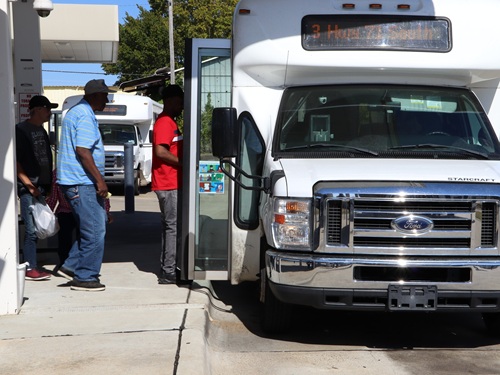The Massachusetts Department of Transportation recently issued $8.9 million for municipalities, Councils on Aging, nonprofit organizations, and other entities via its Community Transit Grant Program.
[Above photo by MassDOT]
The agency said this annual competitive grant program awards funds for transit operating costs, mobility management, or new capital investments.

“Community Transit Grants provide critical funding to local organizations to purchase equipment to help people get where they need to go efficiently and safely,” said Governor Charlie Baker (R) in a statement.
“Our administration will continue to make efforts to work with local leaders, community stakeholders, and the private sector to make transit accessible to everyone,” he said.
That funding covers applications made to the program during 2021 for Fiscal Year 2022. Awards include funding to 27 organizations for 115 vans and mini-buses, plus money to 18 entities for 23 operating and mobility management projects. Award recipients include some of the state’s 15 Regional Transit Authorities, municipalities, Councils on Aging, and eligible nonprofit organizations in Massachusetts.
Funding for MassDOT’s Community Transit Grant Program comes from the Federal Transit Administration as well as State Mobility Assistance Program funds.

“The Community Transit Grant Program is essential in allowing transportation providers across the Commonwealth to adapt and improve their services for the public,” added MassDOT Secretary and CEO Jamey Tesler.
“In particular, these grants will help projects that will benefit individuals with disabilities or others who need assistance while accessing transportation,” he said.
MassDOT’s focus is in line with recommendations made by the Community Transportation Association of America in a 61-page paper issued in July 2021 that chronicles the “new normal” created by the COVID-19 pandemic for the public transit sector – a paper that stresses the important role state departments of transportation play in supporting transit needs.
“The only way to truly manage the profound change and disruption brought on by COVID-19 is to be flexible,” noted Scott Bogren, CTAA’s executive director, in the report. “Community transit operators have always shown amazing flexibility in how they serve their communities and their passengers – and it’s a skill we’ll all need moving forward into the new normal.”
CTAA’s recommendations are to make “public health” a new “focus area” for the transit sector, make fare payment “fairer and more equitable,” focus federal and state government funding on supporting frequent and reliable transit service, strengthen hiring and career development, redesign routes and provide more frequent all-day service, and expand transit’s “demand-response” capabilities.
 States
States
Nick Donohue Appointed Virginia’s Secretary of Transportation
December 12, 2025 States
States

